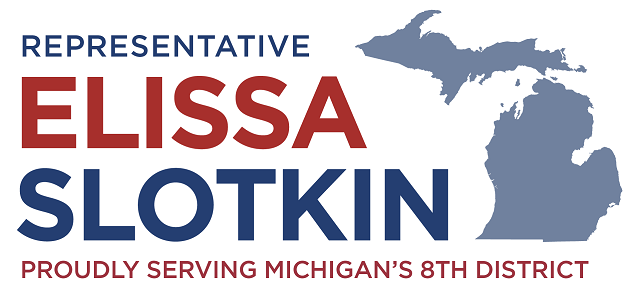DNR Get Involved – March 2022
| Opportunities to get involved with the Michigan DNR for March 2022 |
|
| Opportunities to get involved with the Michigan DNR for March 2022 |
|

 |
|||
|
|
|||
|
Hi there, I want to talk to you about a new bipartisan bill I introduced recently that will strengthen our northern and southern borders: the INTEL at Our Borders Act. This legislation will help enhance our border security and infrastructure through the use of new and innovative technologies. Our immigration system is broken, and politicians on both sides have failed to address the issue for decades. It’s clear that the only way forward is by reaching across the aisle. Introduced in partnership with representatives from both northern and southern border states, and endorsed by the Bipartisan Policy Center, this bill will support our national security while preserving our values and benefitting small businesses being hurt by worker shortages. The legislation directs the Department of Homeland Security (DHS) to:
Through the use of these emerging technologies, we can ensure our borders are secured smartly and effectively, while also relieving staff shortages faced by CBP agents and officers. Border security and American values aren’t mutually exclusive, which is why I also introduced a bill to ensure migrants in short-term custody are treated humanely and respectfully. The Short Term Detention Standards Act will require that migrants receive basic necessities such as bathrooms, water, appropriate nutrition, and sanitation items. And this past week, my Customs-Trade Partnership Against Terrorism (CTPAT) Pilot Program Act, which will expand ‘PreCheck for freight,’ so that more cargo can move more quickly from Canada and the U.S., passed out of the House Committee on Homeland Security with bipartisan support. Border security shouldn’t be driven by politics – it should be treated as the objective, national security issue that it is. As a national security official by training, I have spent my career protecting the homeland, and as chair of the House Subcommittee on Intelligence and Counterterrorism I will continue to support the integrity of our borders and migrant processing. – Rep. Elissa Slotkin |

Press Release FOR IMMEDIATE RELEASE: March 4, 2022 CONTACT: Lynn Sutfin, 517-241-2112, SutfinL1@ Eight Michigan employers named Healthy Michigan Worksites LANSING, Mich. – Eight Michigan employers recently received Healthy Michigan Worksite awards for efforts made to improve the health of their workforce, while another five worksites received honorable mentions. The Michigan Department of Health and Human Services (MDHHS) Healthy Michigan Worksite Award recognizes employers who use Designing Healthy Environments at Work (DHEW) tools and actively invest in wellness programs designed to improve the health of their workforce. The awardees have demonstrated a commitment to enhancing their culture of health by focusing on the work environment along with organizational practices and policies. “These organizations serve as models for other Michigan businesses by taking proactive measures to develop and promote a culture of health and implementing data-informed objectives, often led by diverse and representative wellness committees,” said MDHHS Director Elizabeth Hertel. “Their efforts have the potential to pay off with improved employee well-being, more effective management of health care costs and the ability to attract and retain top talent.” Awards are presented to worksites meeting defined criteria for Honorable Mention, Bronze, Silver (no awards were given at this level for award year 2021) or Gold status. These organizations have established outstanding worksite wellness programs, and can serve as distinguished models that seek to develop and enhance a culture of health. 2021 Healthy Michigan Worksite Awardees
|
Pontiac, Michigan – The Michigan Department of Transportation (MDOT) collectively recognized Oakland County’s three airports as “Airport of the Year” during the annual Michigan Association of Airport Executives Winter Conference in East Lansing. Oakland County completed runway rehabilitations at Oakland County International Airport in Waterford, Oakland Troy Airport in Troy, and Oakland Southwest Airport in Lyon Township in 2021.
“We commend the Oakland County system of airports for the rehabilitation of runways at all three airport locations,” Michael G. Trout, executive administrator of MDOT’s Office of Aeronautics, wrote on the award plaque. “Utilizing local funding for portions of the upgrades, and despite pandemic delays and challenges, the collaboration with airport design consultants resulted in beautiful upgrades.”
The cost of upgrading the three runways totaled more than $12.5 million without utilizing any of Oakland County’s general fund. Federal Aviation Administration (FAA) grants, MDOT grants, and airport user fees funded the infrastructure improvements.
“The improvements are helping us maintain and expand the vital business that’s happening at the airports every day, especially Oakland International Airport in Waterford, the second busiest aviation hub in the state with more than 123,000 annual takeoffs and landings,” said Oakland County Executive David Coulter. “We’re honored MDOT has recognized this critical piece of the county’s economic infrastructure.”
Below is a summary of the three runway rehabilitation projects at Oakland County airports that enhance operational safety, improve visibility, update airport taxiway design, and guidance signage to current FAA standards:


FOR IMMEDIATE RELEASE March 3, 2022 Contact: Press@michigan.gov
Gov. Whitmer Encourages Eligible Families, Individuals to Get a Tax Break by Claiming Earned Income Tax Credit
LANSING, Mich. – Governor Gretchen Whitmer and the Michigan Department of Treasury are encouraging eligible families and individuals to claim both the federal and state Earned Income Tax Credit (EITC) when filing their 2021 income taxes. Those who qualify and claim the credit could pay less federal tax, pay no tax or even get a tax refund.
“We can all agree that after a tough few years, extra money in your pocket will make a difference. The federal and state Earned Income Tax Credits make a difference for Michigan’s families, whether it’s helping them put food on the table or buy new school supplies for their kids. That’s why my budget proposal would triple the Michigan EITC,” said Governor Gretchen Whitmer. “But too many eligible families don’t file for the EITC. So today, I am encouraging every eligible Michigan family to take advantage of this tax credit this year. It’ll get more money back to Michiganders at a time they can really use it.”
Governor Whitmer’s FY23 budget recommendation takes advantage of the opportunity Michigan has to cut taxes for hardworking families by tripling the Michigan EITC to pull 22,000 Michiganders out of working poverty and deliver 730,000 households an average combined tax refund of $3,000 beginning with tax year 2022.
“I strongly encourage all eligible Michiganders to claim the Earned Income Tax Credit,” said State Treasurer Rachael Eubanks. “It’s been a challenging year for many residents and the extra income this tax credit provides can be really helpful to working families. Please take the opportunity to claim the EITC on both your federal and state individual income tax returns — every refund helps Michigan families care for their children and meet living expenses.”
To qualify for the EITC, individuals must:
Michigan EITC calculation instructions are provided on the MI-1040. Tax preparation software calculates the state EITC if the federal EITC is granted. If a federal EITC is granted, the state of Michigan will provide a 6% supplemental EITC when the taxpayer files a state individual income tax return.
For the 2020 tax year, approximately 713,000 Michigan claimants received the federal EITC, totaling almost $1.8 billion with an average credit amount of $2,467.
The state Treasury Department estimates there are thousands of eligible Michiganders who are eligible for both the federal and state EITCs and do not claim them each year.
To learn more about the EITC, go to www.irs.gov/eitc. For more information about services provided by the state Treasury Department, go to www.michigan.gov/treasury |